- Home
- Steve Rasnic Tem
Blood Kin
Blood Kin Read online
Also by Steve Rasnic Tem
Novels
Deadfall Hotel
Excavation
The Book of Days
Daughters
(with Melanie Tem)
The Man On the Ceiling
(with Melanie Tem)
Short Story Collections
Ombres sur la Route (French)
Absences: Charlie Goode’s Ghosts
City Fishing
The Far Side of the Lake
In Concert (with Melanie Tem)
Ugly Behavior (forthcoming)
Celestial Inventories (forthcoming)
Poetry
The Hydrocephalic Ward
As Editor
The Umbral Anthology of Science Fiction Poetry
High Fantastic: Colorado’s Fantasy,
Dark Fantasy, and Science Fiction
First published 2014 by Solaris
an imprint of Rebellion Publishing Ltd,
Riverside House, Osney Mead,
Oxford, OX2 0ES, UK
www.solarisbooks.com
ISBN (epub): 978-1-84997-660-2
ISBN (mobi): 978-1-84997-661-9
Copyright © 2014 Steve Rasnic Tem
Cover art by Pye Parr
The right of the author to be identified as the author of this work has been asserted in accordance with the Copyright, Designs and Patents Act 1988.
All rights reserved. No part of this publication may be reproduced, stored in a retrieval system, or transmitted, in any form or by any means, electronic, mechanical, photocopying, recording or otherwise, without the prior permission of the copyright owners.
For my parents
Emmett Tyler Rasnic
February 1921 − May 2005
Patricia Horton Rasnic
February 1928 − present
Tomorrow, and tomorrow, and tomorrow,
Creeps in this petty pace from day to day,
To the last syllable of recorded time;
And all our yesterdays have lighted fools
The way to dusty death. Out, out, brief candle!
Life’s but a walking shadow, a poor player
That struts and frets his hour upon the stage
And then is heard no more. It is a tale
Told by an idiot, full of sound and fury
Signifying nothing.
— William Shakespeare,
Macbeth (Act 5, Scene 5)
“The past is never dead. It’s not even past.”
— William Faulkner,
Requiem for a Nun
Chapter One
WHEN MICHAEL HEARD the noise of his grandmother falling in the bathroom, he went out on the porch and sat down where white paint had gone to gray and then to bone from all the backsides that had rubbed there; he had not knocked on the bathroom door, he had not inquired as to her condition. He’d gone immediately, without thinking, to the front door and through it, to the family’s traditional meditation center, that worn-out patch of rotting veranda, from where you could see as far as you wanted to see.
He might let her die. He might be killing her.
But he couldn’t be sure she had fallen. He thought he’d heard the thump, the slap of bare, scrawny flesh on linoleum, but that mighthave been justweary feet padding over to the sink.
He’d felt a little bit of her pain, then, but he was always feeling her aches and pains. Not that he had her expertise in the family talent. She’d felt it when he’d stepped in front of that car a couple of years ago, gambling on death or disability — he didn’t care which, a thousand miles away from here.
For him it had always been more subtle: a notion that someone was in trouble, an inkling of things falling apart, a vague suggestion of future or past events. Uncontrolled, maddening, useless. And before that key event with the car — no accident, more a game of Truth or Dare played with himself — there had been a collection of observations which told him he’d be returning here soon. There had been the landlady who swore he’d received a phone call from his mother (dead many years now). And the neighbor who suddenly started calling him Jake. And the package that had arrived full of dead leaves.
But his grandmother had grown old with that sort of feeling into other people’s hurts, and all the old Gibson cousins used to say she was the best in the family. Which meant being cursed.
She probably wasn’t badly hurt at all. She was old, and pain came with the territory. There was no good reason to think she was lying there dying.
Disgusting, decrepit old woman. As it was he’d never get her smell off him. At least if she wasdead he wouldn’t have to listen to, or live, her stories anymore.
The thought of her dead made him rub his arms from the chill. Anxiety was suddenly crawling up and down his fingers, making his palms wet and itchy with apprehension. He was getting to be more and more like a gen-you-wine Gibson every day. Where was his sympathy? His gratitude? He was just tired, was all, but he was almost ashamed of himself. Almost.
He stared at the yard. Morning light left a slightly milky sheen over the tall blades. Like moonlight, if the sky were a darker shade. Cold light. He watched the wooden lawn furniture resting near the house like furniture in a quiet parlor. Watched as if there might be activity there he wasn’t seeing yet. His grandmother had had quiet rooms like that, a long time ago. Now they were crowded with dead relatives’ furniture and the fodder for more of her tales.
The lawn furniture leaned toward the house. Cored with rot, probably. He couldn’t imagine what held the pieces up unless it was the energy generated by the rotting process itself. Like some people he knew. The furniture cast no shadow. The minimal contrasts, the grayness between objects made him feel groggy, as if he had carried a sliver of dream with him when he climbed out of bed that morning, and now it was infecting him.
The calming green of the grass drew his gaze further down the lawn, to the walk of ashen flagstones, dark in the morning, and past that to the narrow dirt road which looked so damp and cool, but was neither.
And on the other side of the dirt road, across a narrow ditch invisible because of the tall thistles that filled it, so that he never could know what lay along its winding bottom, the layers of his family prison began to peel back, to the dense wall of olive and black-green trees that shifted ponderously out of the mists as the vapors moved in and out and between them, their bulk lightening in the morning shine.
And though unseen, he knew that beyond those trees lay the advance inlets of a vast kudzu sea lapping at the far edge of the woods. The restless kudzu, temporarily stymied in its march across the valley by this great wall of trees, had made itself known with the occasional bright green runner snagging Michael’s attention.
Beyond that, he knew, was the glen, now four feet deep in large-leafed kudzu. A small house like an outhouse or a smokehouse was buried at its bottom, shingled in rough bark and walled with planks no two the same width.
Which held the long narrow crate with the well-nailed lid, reinforced and bound in thick iron.
Which held his death, apparently, and his grandmother’s death, and perhaps the deaths of everyone in the valley if he did not understand his grandmother’s tales well enough. If he could not peel all the layers away from their hearts.
He could hear her stirring in the kitchen. He wasn’t sure how long he had been listening to her unawares, the pings of pots and spoons, and the soft clank of pans rising out of the sound of the cricket songs cocooning the dusk-darkened house.
He’d lost a day again, dreaming of the crate buried under kudzu, and dreaming her stories as if they were his own confession. Losing his life in the process. She wouldn’t be content until he knew all her tales and had no thoughts of his own for keeping track of the time or the year.
So she
wasn’t dead after all. And soon she’d be calling him in to make her dinner, and then to put her on the toilet, and then to help her bones into the hot bath, and then to lift her out again so she could towel herself off, and then to listen to her long stories of a brown and gray past, days long curled and turned with their backs to the cold Virginia breezes.
And he knew that despite himself, although he was tired of it, and long past resentful, he would take all her words inside and make them his own, make another past in which he was the scrawny little cornhusk of a girl, Sadie, focus of her daddy’s unwelcome attention, a young cricket playing the day out through the woods and down the dirt streets of Morrison, Virginia, that ancestral home of all the Gibsons since forgotten forebears hadleft their Melungeon plateau in Tennessee.
He couldn’t help himself. He had been born into the feeling and the witnessing and the making of what he heard, and felt, to be his own.
The sky was almost the color of his skin now — a dusky almond. Out in the world numbers of people seemed inclined to find him and his burnished color attractive, and he had always taken advantage of that fact. Other people’s feelings were only a skin’s depth away, and once you knew what a person — especially a woman — was really feeling, you had her. You had the key to what you wanted — money, favors, sex, the alcohol and drugs which had become his main interests. Not much nobility in that, he supposed, but what was wrong with using what you had?
He used to wonder if maybe he was too smart for his own good. The arrogance embarrassed him now. He used to believe that if you were smart, you understood that life was meaningless. Tomorrow and tomorrow and more tomorrows still. All of it the same, all of our concerns petty. Without substance and full of dramatic, idiotic gestures. Perhaps that was true but at least now he wished it wasn’t.
Here, tucked up under the Morrison Ridge, many looked at him with vague suspicion; his color had become a central fact of his existence. His confidence was damaged, but more than that, the fact that he had behaved so badly when he’d had the advantage of an exotic appearance made him feel shame. He was darker than most. He was Indian or black. He was maybe part Portuguese or gypsy, or some throwback or creature from another world. He had skin the color of walnuts or papaws or light maple syrup. Sometimes he fantasized that when the sun went down you couldn’t see him, and he might slip his dusky body through a crack in your sleep and make himself a yellowed shadow in your dreams and whisper vague things to you that would disturb you and maybe your entire family forever. Quite a few people in the hills went mad; folks had to have some reason, somebody to blame. He was a Melungeon, or descended from them.
These days lots of people claimed the lineage — because off and on it was fashionable. When it wasn’t fashionable, any hillbilly with slightly darker skin was accused of it and looked down upon as shiftless or lazy. But he decided to take pride in it, even though he didn’t really understand what it meant, and even though some members of his own family had clearly been unworthy of the heritage. He had to take pride in something, with the things he had done, the disappointment he must have been to his friends because of all the broken promises, how he had used them.
His grandmother had never mentioned his drinking or his drug use, but being around her now, he realized she must have known.
At least he couldn’t get a variety of drugs here, not good ones. The heads in the county used that cancer drug Oxycontin, hillbilly heroin. There might be some meth, but so far he hadn’t seen any, and he’d never leaned in that direction anyway. The county was dry, and some of them still drank moonshine because it was cheaper than whiskey, accessible, and had a terrible kick — it tasted like some kind of fuel, kerosene maybe. You could buy some from this kid Mark Jepsen, if you really wanted to. Jepsen’s family had been in the moonshine business for generations.
Michael wasn’t seriously tempted. Apparently he had a window into not only other people’s needs, but also his own. His rehab counselor used to say he’d never really change unless he hit bottom, but Michael never would hit bottom. He knew how to hover just above bottom, and maybe that wasn’t a good thing. He wasn’t using anymore, but he was far from cured. Maybe he didn’t want to be cured. His addiction was his secret pill, something he could always take if things got really bad.
But how did you fill your day? That was the big question. You had to fill it somehow.
When he lived here as a teenager any one of his elderly female cousins would take him into their very similar parlors and tell him the story of the Melungeons, with little variation in the telling, except that Cousin Lillian’s version was always a mystery story, Cousin Ella’s a kind of heroic epic poem.
“No one knows where we come from,” Cousin Lillian always began her tale, whereas Ella was likely to start off with something like, “This is the legend of the Melungeons, your forefathers and mine, their trials and tribulations, their struggle against blind prejudice, and their eventual triumph as one of the finest and most respected old families in the Morrison valley.”
Needless to say, he had preferred Lillian’s version, even after hearing it a dozen times. She always forgot having told him, and she wouldn’t have heard him even if he had said so.
“The first Scotch-Irish explorers into the East Tennessee mountains discovered us,” Lillian continued. “On a high plateau, in an area where white men had never been seen and in fact further than any civilized person was thought to have ventured until that time, they found a village of almond-skinned people — similar in color to the Portuguese or Indians — who spoke a kind of Elizabethan English. They had simple tools, and crosses, and appeared to practice a variety of Catholicism. But they had no written records, and even the oldest of them had no idea how they first came to be there.”
At this point Lillian would pause as long as ten minutes to let that first part sink in. Despite himself, every time Michael was intrigued by the enormity of the mystery surrounding the origins of his people. Then Lillian went on about how the Melungeons, from the French mélange, “a mixture,” were considered blacks or worse to early white Southerners, and suffered some of the same restrictions concerning voting and land ownership. No one ever uncovered the answers to their mystery, although the theories were many. Cousin Lillian preferred the one that said they were Raleigh’s Lost Colony. Cousin Ella liked to think they were descended from Ponce de León’s men. Neither cared to discuss the theories that they were descended from runaway slaves and half-breed squaws.
Grandma Sadie almost never spoke about Melungeon history. Michael wondered if she thought it useless now. Maybe she didn’t think it had much to do with her. Once when he brought it up she said, “Oh, we be darker than that. And I aint talking about skin. We aint hardly even Gibson. We come from a darker branch.”
And that was as much as she would ever say on the subject. Grandma’s version flavored Lillian’s in a peculiar way — they didn’t seem inconsistent, but maybe just two facets of a complex whole. Michael imagined the day those explorers first found the Melungeons up on that plateau, and this one group hiding unnoticed off to the edges, shadows of the others, strangers among the strange.
“Mich… aaaell…” The whisper was soft like lizard husk dragged through leaves, the lizard jerking his legs slowly to rid himself of his old suit. The way her breath broke in the middle of his name… she was old, God, how she was old.
He turned on his hips and stared at the greasy oval on the screen door. Two spots of egg white appeared, and dry lips the color of earthworm. “Michael…”
When the lips disappeared into the dark of the stain,Michael stood up and limped toward the door. The leg was better, but some mornings it still stiffened up, and fought him.
They said nothing for most of supper, although he could hear her lips moving wetly, preparing to speak. He could hardly bear it. He thought he might scream, waiting. “You heard me… fall, Michael.” The whisper crackled like an old recording. She kept her head bowed, her nose hovering just a few inches above th
e sweet potatoes and tiny piece of pepper steak, so that he couldn’t see her lips move. It was a maddening habit; sometimes he thought she did it on purpose, to emphasize her power over him.
It was as if she spoke inside his head. “Michael…”
Only his family had ever called him that. He hadn’t been called that when he left here. Everywhere else it was “Mike,” or “MG.” “Michael” was a stranger’s name.
“Michael…”
He looked at her. Why didn’t she just say it?
“You want me dead…”
At last.
“I… do… understand.” She said nothing more for the rest of the meal.
He did his leg exercises after dinner. Back in Denver, before he was lured here by his grandmother to help take care of her and in return live rent-free, he’d stopped doing them, preferring pain pills that numbed him just enough without wiping his memory of the stupid thing he had done. His girlfriend at the time, Allison, pretty much did everything he wanted or needed. All he had to do in return was make her feel an essential part of his life. He’d had an enormous talent for that sort of thing. Sometimes now he thought about writing her and apologizing, but he wasn’t sure if she would understand why he was apologizing. He liked her — maybe someday there could be something there. But better for her if she never heard from him at all.
He couldn’t get cell reception out here, and his grandmother didn’t own a phone. Whoever heard of not having a phone? For a while he just used his cell phone to play games, until he got bored and put it away in a drawer somewhere. He wasn’t exactly sure where.
She at least had an old TV hooked up to a small antenna outside. It got one, sometimes two channels, both of them fuzzy. Sometimes he watched the news, but the news outside seemed to have less and less to do with the world here in the hollow. Now and then he’d watch a show or an old movie, but night scenes were impossible to see on that TV, so sometimes he’d just make up where they were. It was like living in the old times, in the days before any significant electronics. And the crazy thing was she seemed to like it that way. Crazier still was that he was starting to get used to it.

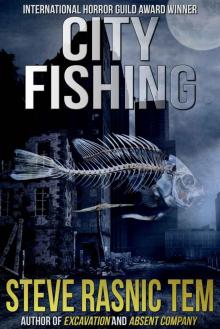 City Fishing
City Fishing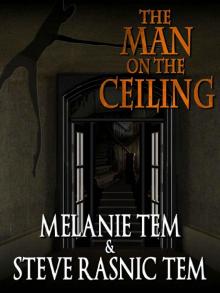 The Man on the Ceiling
The Man on the Ceiling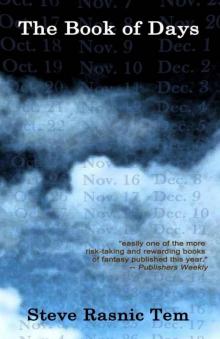 The Book of Days
The Book of Days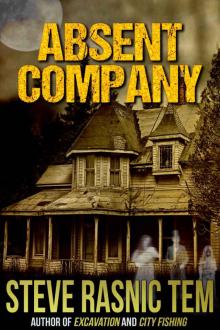 Absent Company
Absent Company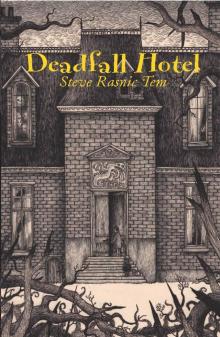 Deadfall Hotel
Deadfall Hotel Celestial Inventories
Celestial Inventories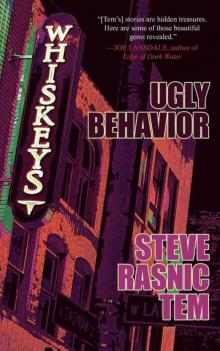 Ugly Behavior
Ugly Behavior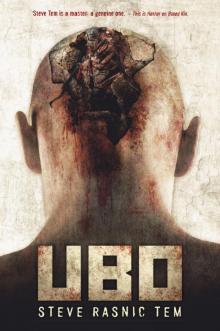 Ubo
Ubo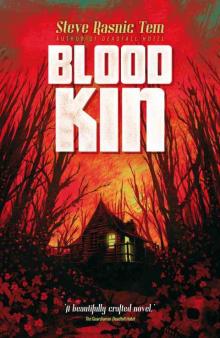 Blood Kin
Blood Kin